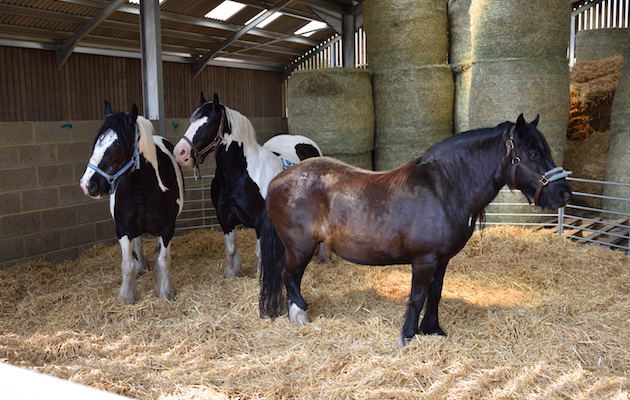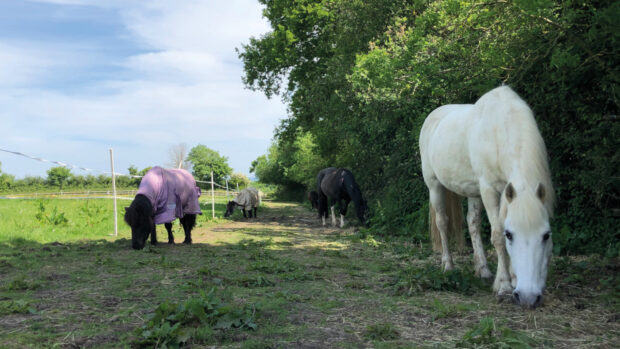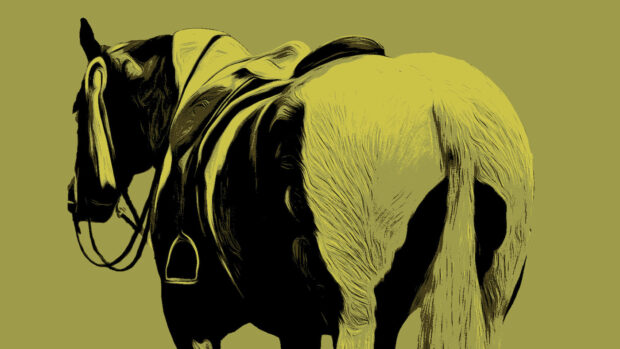Owners have been urged to take action now to kick-start equine weight loss, to prevent the development of serious health conditions.
Leading veterinary figures are warning that obesity is the biggest issue facing UK equines today, and that failure to act on excess weight can have fatal consequences.
David Rendle, a specialist in internal medicine at Rainbow Equine Hospital, Yorkshire, warned that laminitis is the most serious issue, and that although native-type ponies are more prone to the weight gain that causes it, other horses and ponies can also develop the condition.
Mr Rendle, a member of the British Equine Veterinary Association’s medicines and ethics and welfare committees, added that although much has been made of PPID (Cushing’s) as a cause of laminitis, “more horses and ponies are getting laminitis because they’re fat”.
“Unfortunately people often don’t notice the obesity,” he told H&H. “Weight gain occurs gradually and people are now so used to seeing horses that carry large amounts of fat that overweight is seen as normal. It is easier to treat with a medication, whether for PPID or equine metabolic syndrome, than to implement management change but without the latter management of laminitis is often unsuccessful and bouts of laminitis recur. Most cases of laminitis are entirely preventable with correct management.”
Mr Rendle said some people’s perception of body condition score is skewed, so owners often believe their horses should be fatter than is ideal, and that while laminitis is the most serious consequence of obesity, there are of course other issues such as equine metabolic syndrome and an increased risk of orthopaedic disease, undesirable behaviour and poor performance.
Vets told H&H that owners should take advantage of winter – with its poorer grazing and horses’ increased need of calories to keep warm – to kick-start weight loss. Horses have evolved to lose weight in winter and put it on during spring and summer. While many still do gain in summer, modern practices mean fewer horses shed weight during winter, which leads to year-on-year weight gain with the associated welfare issues.
Advice from vets includes appropriate feeding, rugging and exercise, summarised in a list of tips for owners.
Continues below…

Vets’ top tips for vital winter weight loss
Top vets have shared advice on how to get horses and ponies in suitable condition before the spring

‘They’re getting fatter and fatter’: Vet’s warning over obesity-related equine deaths
‘As a rule, you’ll get much more criticism on a livery yard if you can see ribs than if your

Subscribe to Horse & Hound magazine today – and enjoy unlimited website access all year round
“To be ready for April/May, people need to take action now,” Mr Rendle said.
“There is no doubt that obesity is the biggest threat to equine welfare in the UK today, we are a nation of horse lovers and in loving our animals too much we are exposing them unnecessarily to potentially fatal diseases.”
World Horse Welfare research and education officer Alana Chapman, said: “Overweight horses and ponies continue to be one of the most pressing welfare challenges facing our equine population today and so it is essential that owners take the necessary steps to manage their equines’ weight.
”Their weight needs to be monitored regularly throughout the year using a combination of weight taping (or using a weighbridge if you have access to one) and body condition or fat scoring. This allows you to quickly spot any changes and address them straight away through diet, exercise or day to day management.
“In winter it is natural for horses to lose a bit of weight as they expend more energy on keeping warm and for many horses it is important they do so in order to help keep them within healthy weight range when the spring grass comes through. Speak to your vet if you need any assistance.”
For more on equine obesity, as well all the latest news analysis, competition reports, interviews, features and much more, don’t miss this week’s Horse & Hound magazine, on sale 10 January.




